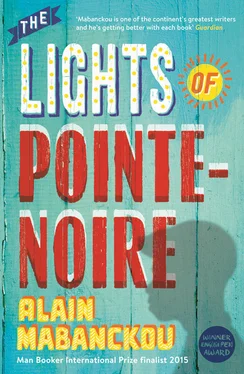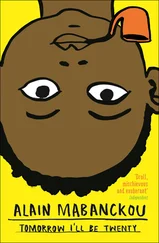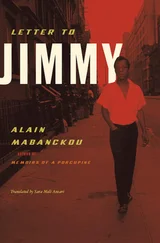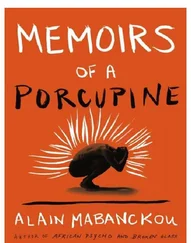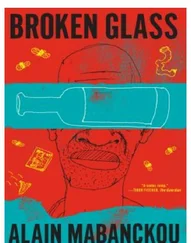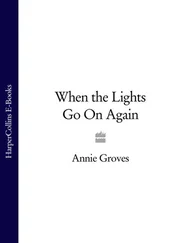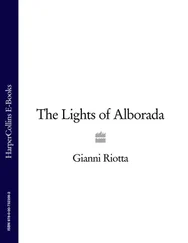‘There she is! There she is! Help me chase her away!’
‘Chase who away, Grandma? What?’
‘The shadow behind you!’
‘That’s not a shadow, Grandma, it’s someone who’s come with me and…’
‘It’s a shadow, I’m telling you, I see them all the time now! The Virgin Mary helps me chase them away. Please, help me chase that shadow there, watching me… Just do it for me.’
‘Grandma, that’s my girlfriend, we arrived together from France a few days ago and…’
‘Is she black or is she white?’
‘She’s white.’
‘Are you sure?’
‘Yes.’
‘Oh, then I’m saved! I’ve waited for her for years. I can go now, she’s come to set me free…’

At the family reunion to celebrate my arrival, I noticed two empty chairs opposite me, and two glasses filled with palm wine placed before each of them. Everyone had an explanation, except me. Just to be clear, I asked whether we were waiting for two more people, because there were already over thirty of us on the plot left by my mother. Looking embarrassed, a cousin whispered in my ear:
‘It’s your mother and father sitting on the two chairs. You think they are empty but in fact they are taken…’
And she explained that other members of the family were absent, at rest in the Mont-Kamba cemetery, the burial place for the common people, at the other end of town…
I walked round ‘Maman Pauline’s plot’, as they say here. There is a tiny hut tucked away in one corner of the property. Almost a blemish on this neighbourhood of solid buildings, with electricity. Every property in the Voungou neighbourhood has been carefully fenced in. Except ours, where the hut seems to have pointedly refused this practice, preferring the mode of the old communist regime, where we were told that everything belonged to ‘the people, and the people alone’. There was no point marking out the limits of your land, because no one, in principle, owned anything, only the state, which could exercise its own prerogative and dispossess inhabitants in the ‘collective interest’.
Once the traditional chiefs started to sell off land, it was sensible to build ‘something’ on the land you acquired, in case those no-good dealers from the city sold it with false property deeds. These kinds of makeshift dwellings were known as ‘houses for now’, since the inhabitants hoped to put up comfortable homes at some point in the future. They usually died without having built the house of their dreams, having never had the means to do so.
My mother acquired her plot in February 1979. I had just turned thirteen and was at Trois Glorieueses secondary school. I can still remember the seller coming round, a chief of the Vili people, who bargained with my mother and tried to increase her bid, claiming he had other, higher offers. My mother, an experienced businesswoman, pretended to have lost interest in the purchase and indicated to the seller that he could do a deal with the highest bidder, since she had now found another piece of land, in a better position, in the centre of town.
A week later, the seller came back to see us in the studio we rented in the Fonds Tié-Tié neighbourhood. He had changed his tune, and modified his exorbitant demands. Where had all those clients gone, who’d been fighting to get in the door? He breathed not one word about them. The moment he accepted my mother’s offer of a beer, I knew he had capitulated, and had fallen into the trap skilfully laid for him by Maman Pauline, on whose lips I detected a look of triumph. She even rejected the average selling price for the neighbourhood.
‘I’m not buying this land for myself, it’s for my son,’ I heard her argue.
I don’t know what other arguments she put forward, but I saw her take out some crumpled notes, unfold each one, and count out loud under the watchful eye of the greedy vendor. The trader stuffed the money into a plastic bag which he pulled out of the back pocket of his trousers. Which convinced me that the sale would definitely be completed that day, since he had thought to bring along something to put the money in.
They arranged a rendezvous for the following day, to finalise the sale with the authorities.
We had become house owners, and my father was not to learn of it until later, on the day we moved in…
We planted maize on the land we had just acquired. But that wasn’t enough, we needed to give a clear sign to the crooks that we were the new owners. Uncle Mompéro, my mother’s younger brother, set about building a house made of wooden planks. I stood behind him, and from time to time he asked me to hand him the saw, the set square, the nails or the boards. I was proud to feel useful, to feel that I too, with my little hands, was contributing to the construction of our home. While the building work was going on, my mother prepared food in a corner, which we would eat during the afternoon break. She had engaged two Zairean builders, because she wanted a proper floor, even if the house had to be of planks. In less than a week, the house had taken shape, standing in the field of maize. We had left the house we were renting in the Fonds Tié-Tié neighbourhood and had moved in one morning, even though a storm was looming, threatening a heavy downpour. Our house had two tiny bedrooms and a small living room. I had one room, my parents the other. Uncle Mompéro himself slept in the living room in a bed he had built himself. And when two members of the family arrived from their villages — my mother’s cousin, Grand Poupy, and Papa Roger’s niece, Ya Nsoni — I let the latter have my room and slept in the living room with my uncle, together in the same bed. Every evening Grand Poupy spread a mat on the ground, and some nights I slept with him.
Back here again, I find it hard to believe this is the same house we had then. The family reunion is being held in the middle of the yard. My facial expression, one of utter astonishment, is being closely watched.
Uncle Mompéro, who took me on a tour of the plot as soon as I arrived, revealed that a part of the house had been ‘cut off’, leaving only the one room, where he sleeps.
‘Can we go in and look?’ I asked.
‘No, I don’t want you to go inside…’
I didn’t insist, and we went back into the yard, where things were beginning to liven up since the drinks had arrived…
Towards the end of the party, I leaned over to my cousin Kihouari, to ask him for the ‘right to occupy’ paper that my mother signed back then. It is a pink piece of paper handed out by the land registry office, bearing the family name and forename of my mother. It says that the land has a surface area of four hundred square metres. Just looking at it, I doubt it is as big as that. Kihouari tells me that there are indeed four hundred metres, as stated in the description from the land registry, but our neighbours at the back encroached by several square metres when they built the wall dividing our land from theirs.
‘This wall is actually on our land…’ he concluded, looking resigned.
I recall that in the past the two plots were separated only by some stakes and barbed wire. At that time our neighbours had also built a ‘house for now’, a bit bigger than ours. Now they have a huge, permanent structure and this wall, which stops us seeing what’s going on at their place.
Uncle Mompéro is listening in and gathers what Kihouari is telling me. My uncle adds, in quite a loud voice, as though he wants the whole family to hear:
‘After we buried my sister, Pauline Kengué, the neighbours didn’t wait even two weeks, they put up this ridiculous wall without even asking us! And they pinched a few square metres from us while they were about it! Is that acceptable, d’you think? That wall is on our land!’
Читать дальше
